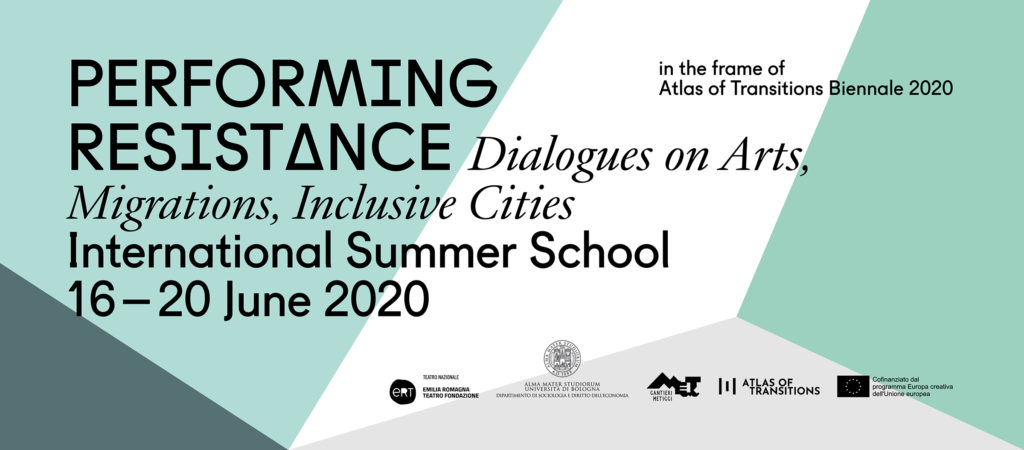
Something great has happened in June! Graviting around themes like art, migration and inclusive cities, Performing Resistance, a series of online talks, lectures and meetings featuring scholars, curators and international artists has virtually taken place. Organized in the frame of Atlas of Transitions Biennale and collectively curated by Piersandra Di Matteo, Pietro Floridia, Melissa Moralli, Pierluigi Musarò, the Summer School programme has analysed the nexus that binds together art and migration from different perspectives. Using different methodological tools, from Sociology to Performance Studies, what has emerged is a agonistic space where differences, other narratives, and new relationships between inhabitants and urban environment, can emerge and interact each other.
The Digital Formula was able to reach more than 1.200 partecipant/viewers coming from all over the world: Nigeria, Mexico, Jordan, India, Brazil, USA, as well as European countries such as Austria, Poland, England, Germany, France and Italy. It has been succesfull in opening a debate truly withouth borders.
Below you can freely access, watch and rewatch the recordings of each live streaming lecture that will remain at your complete disposal on this website.
Talk #1 | The Populist Uses of Victimhood in Covid-19
Lilie Chouliaraki in dialogue with Pierluigi Musarò
Lilie Chouliaraki, professor at the London School of Economics and Political Sciences, investigates the process of symbolic representation of "victim" in the current pandemic.
Talk #2 | Archiving the Waywards and their Archives: a Black Dramaturgical
Tunde Adefioye in dialogue with Kasia Tórz
Dramaturg and lecturer Tunde Adefioye reflects on the spaces occupied by black people and their archives in Europe, suggesting the necessity of a black dramaturgical foundation.
Talk #3 | Politiques et éthique du refuge
Sophie Djigo and Camille Louis in dialogue with Emilie Da Lage
Sophie Djigo, philosophe et Camille Louis, philosophe et dramaturge, ont toutes les deux organisé des réseaux d'hébergement des exilé.e.s confrontés à la violence à Calais et Paris. Comment prendre acte de la politique de l'épuisement menée contre les personnes exilées et leurs soutiens pour se donner les moyens d'agir, mobiliser les énergies, ouvrir des refuges, parfois temporaires. Quel rôle les institutions culturelles peuvent elles jouer dans cette "politique du refuge"?
Talk #4 | Reframing the Narrative of Migration through Art
Federica Mazzara in dialogue with Francesca Guerisoli
Federica Mazzara, Senior Lecturer in Intercultural Communication at Westminster University, analyzes the artistic strategies to challenge the narratives that negatively stigmatize the "figure" of migrant, focusing on the issue of death at sea.
Talk #5 | Critical Potential of Border Aesthetics
Karina Horsti in dialogue with Melissa Moralli
Karina Horsti, professor at the University of Jyväskylä (Finland), proposes a critical reflection on cultural institutions, artists and activists as agents of transformation in perceiving the invisibilized borders, analyzing the consequent effects.
Talk #6 | Expériences esthétiques au service de la société
Léa Drouet in dialogue with Edith Bertholet
Le dialogue avec l'artiste Léa Drouet explore l'expérience esthétique, la perception, l'élément sonore et corporel, considérés comme des moyens permettant d'analyser des questions politiques et sociales.
Talk #7 | An Atlas of Invisibilized Knowledge
Daniel Blanga Gubbay in dialogue with Piersandra Di Matteo
Daniel Blanga Gubbay, co-director of Kunstenfestivaldesarts in Brussels, investigates the dispositif of knowledge, educational projects conceived within artistic institutions, capable of producing common spaces and modalities of transmission for invisibilized forms of life.
Talk #8 | Mediterranea. Rethinking the Politics of Migration in Hard Times
A dialogue between Michael Hardt and Sandro Mezzadra
Sandro Mezzadra, professor at Bologna University and Michael Hardt, philosopher and professor at Duke University, discuss the experience of Mediterranea #Saving Humans as starting point for a debate on crucial issues related to the current migration policies.
Talk #9 | Nocioni i të Bukurës Artistike në Mjetet e Komunikimit Masiv
Hektor Çiftja in dialogue with Ardiana Kasa
Hektor Çiftja analizon nocionin e bukurisë në art dhe mbështet teorinë se ekziston ideali i bukurisë në mjetet e komunikimit masiv. Nëse ky ideal përdoret me përgjegjësi dhe perceptohet në mënyrën e duhur nga audienca, ndihmon në ndërveprimin mes kulturave dhe në integrimin e njërës tek tjetra.
Talk #10 | Performing Arts and the Slow Emergence of a Post-racial Generation in Urban Europe
Marco Martiniello in dialogue with Annalisa Frisina
Marco Martiniello, director of the Center for Ethnic and Migration Studies at the University of Liège, analyzes the "post-racial" generation and its manifestation through collaborative artistic practices locally rooted and interconnected at a transnational level.
Talk #11 | Synthesising Art and Scientific Thought as a Method of Resistance
Minna Salami in dialogue with Ilenia Caleo
Journalist and activist Minna Salami investigates the notion she has coined of "Afropolitanism" and the need to activate a feminist and "sensuous knowledge" capable of opening up to decolonial and anti-racist approaches.
Talk #12 | Post Pandemic Public Art
Nikos Papastergiadis in dialogue with Emanuela Piga Bruni
Nikos Papastergiadis, director of the Research Unit in Public Cultures at the University of Melbourne, proposes a reflection on the future scenarios of public art and its key role in sharing imagery and collaborative practices in the post-pandemic urban context.
Talk #13 | Performing Diversity. Perspectives and limitations
Weronika Szczawińska and Mohammad Al Attar in dialogue with Paweł Sztarbowsk
Director Weronika Szczawińska and playwright Mohammad Al Attar discuss their pathways, experiences and artistic strategies linked to narratives, representations of diversity and migration.



